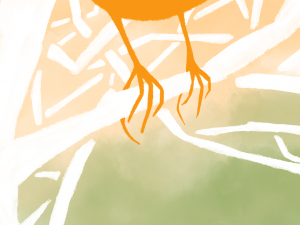
The ISIS Short Essay Competition: ‘Is it rational to fear your own death?’
by Jordan Horfield | March 5, 2015
I am not dying, but I am afraid. My friend is. My dearest, closest friend, who I have spent thousands of hours and exchanged millions of words with: dying, quite quickly, and there is nothing really that anyone can do. I don’t know what afterwards will be like – I can’t imagine, and I don’t want to try. But I know there will be a gap, every day, where my friend used to be, and I’m afraid because I don’t know if, or how, I will fill it.
Is this what it is like to fear death? Maybe it is, a little: this dark apprehension in the pit of your stomach, the sense that things aren’t going to be the same, that the plans and idle daydreams about the future are pointless now, because their point was a little too far away and is now beyond your reach. The not knowing. It can’t be much like this, though, because I haven’t cried, much. My friend cries a lot, and is more scared than I’ve ever seen anyone. Maybe, a little: like this, but for everything, because there is nothing in your life exempted, nothing else to turn your mind to, nothing that will go on.
I get the impression that dying is not easy. People will laugh at that – or frown, perhaps – because it is so self-evident. But it is easy to forget how everything we say and do centres on life. People ask what I am doing after graduation. I have an answer; I don’t have to bite my tongue and push back my tears because I have just been reminded of a time when I will not be there. People complain about inconveniences, irrelevancies – we mock them, say, “you’ll probably live” – and it is just idiom, dead metaphor – except for my friend, who won’t. People plan their holidays, their birthdays, their careers, their marriages – a whole world, from which you are cut off. So you are afraid.
And now we are asked: is it rational to be afraid? I do not know what this means. Just: should I fear my death? But then why rational, why pretend that reason is what’s supposed to guide us here? Maybe: would an economist, or a robot, fear death? I find myself not caring.
Here is something I learnt once. David Hume was a Scottish man who was troubled: he worried that people might be saying more than they knew. When you play billiards and hit one ball against another; when you put your hand in a flame; when you drink poison – how do you know these things will behave like they have before? And in the language of the time – how are they justified, how are they rational? Hume decided they weren’t. But it didn’t matter, he said: we learned them from habit, and would go on doing so and it didn’t much matter if they were rational or not.
That, unsurprisingly, was not a pleasing answer for most. It was so upsetting to Immanuel Kant, so the story goes, that he was moved to action, to find a solution. Through hundreds of pages of prose dense and inscrutable even by the standards of German philosophy, he tells us that it is not just that we have these beliefs, and by habit always will – in fact we need them, we could have no experience of the world without them. Perhaps there is some story about what ‘rationality’ is, according to which these core beliefs are not rational – well, then, either that story is wrong, and rationality is something else, or it is something alien to us, something we need not and cannot care about because it impugns beliefs we need not and cannot abandon.
So, is it rational to fear your own death? I want to know before I can answer: why are you asking? Why should I care? Because this is not, in my limited but terrifying experience, a domain in which your assessment of what is rational, of what you should do, plays any part. When your friend blacks out and stops breathing in front of you, your tired, sad, scared brain doesn’t have the time or the capacity to ask or remember what would be rational now. It panics: about what’s happening, about whether they are gone. And then your friend gasps back and looks at you and asks – “everything was dark… where was I?” – and you say something, and in all this there is not much thinking, not much choosing, not much space for rationality. And you are not even dying – so you offer your hand to hold, and you hug, and you to try to bury your fear because you know that theirs is worse.
The question doesn’t belong. Its air of profundity, of being something that matters, is a lie – as if it would be any help, to know that your gnawing, crippling fear wasn’t rational, or any reassurance to hear that it was. And so is the belief that there should even be an answer – as if rationality, something that people invented, and that is mostly the plaything of academics toting models, would ever have something useful or meaningful to say about the hardest, most frightening – most inevitable – part of human life. Reason doesn’t come this far. We are stuck here, out on the far edge, with fear and hope and love, and that will have to do.
Runner-up in the ISIS Short Essay Competition, Michaelmas 2014
Image by Sarah Pannell




